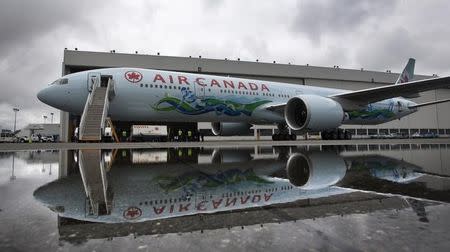Air Canada has second-quarter profit but falling yields hit shares

(Reuters) - Air Canada notched a higher operating profit on Thursday but its push into new overseas routes, with longer flights and lower margins, took a toll and sent its stock down nearly 7 percent. Canada's largest carrier said yields, or passenger revenue per available seat mile, a key measure of revenue, fell in the quarter. Besides adding new routes, the carrier also boosted the number of flights and added more seats to major European destinations. Chief Executive Calin Rovinescu said he expected third-quarter yields to be little changed from the second quarter. "The yield is affected by both the stage length and the fact that we are, you know, investing ... more in the economy class here through the additional density," Rovinescu told analysts on a conference call. Air Canada shares fell as much as 6.7 percent to C$8.62 on the Toronto Stock Exchange, the lowest since May 28. BMO Capital Markets analyst Fadi Chamoun said in a note to clients that the results were "a mixed bag." Air Canada has reported losses in 18 of the last 25 quarters as it struggles with labor disputes, pension bills, increasing competition and the collapse of its Aveos maintenance unit. Under a plan to improve earnings, Air Canada is expanding its low-cost vacation carrier, Rouge, reconfiguring its fleet and continuing a cost-cutting plan that is expected to save more than C$100 million annually, within the next five years. Adjusted cost per available seat mile (CASM) - a measure of how much an airline spends to fly a passenger, excluding fuel - fell nearly 5 percent. The company said it expects CASM to decline slightly more this year than what it had predicted in May. It now expects a fall of 3.2-4.2 percent, down from 3-4 percent. "We expect weaker yields to weigh on investor sentiment today despite strong progress on the cost transformation initiative and improved full-year CASM guidance," RBC Capital Markets analyst Walter Spracklin said in a note. "Cost reduction is at the core of our positive long-term thesis on Air Canada. Therefore, second quarter results reinforce our favorable view." The Montreal-based carrier said advance ticket sales of C$2.3 billion were the highest in its history, and suggest its increased capacity is being absorbed by market demand. The airline reported an 8.5 percent rise in capacity and a record 84.2 percent load factor. Air Canada posted a net profit of C$223 million, or 75 Canadian cents per share, for the three months ended June 30. and benefited from a C$41 million ($37.5 million) tax gain. It lost C$23 million, or 9 Canadian cents per share, in the same quarter last year. Closely watched EBITDAR, or earnings before interest, taxes, depreciation, amortization and impairment, and aircraft rent, rose more than 18 percent to C$456 million. The airlines' cost-cutting efforts coincide with increased competition from WestJet Airlines Ltd, which is looking to expand both long-haul routes and its domestic flights. ($1 = C$1.0923) (Additional reporting by Susan Taylor in Toronto and Sayantani Ghosh in Bangalore; Editing by Savio D'Souza and Richard Chang)

